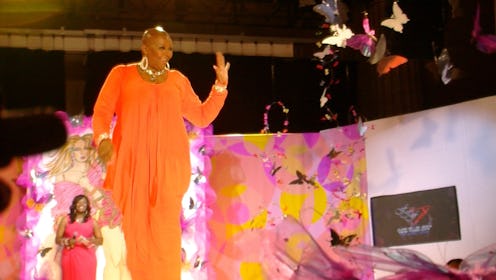Entertainment
This Fashion Doc Is For "66 Percent" Of Women

Global fashion weeks are an all-consuming entity for the internet, the press, and almost anyone vaguely interested in style. However, as pointed out by reporter and producer Natalie Abruzzo's latest documentary project, The Sixty-Six Percent, New York Fashion Week ignores 66 percent of women; because New York Fashion Week isn't for plus size people. Instead, this documentary focuses on a fashion week sorely underrepresented in the public eye: Full-Figured Fashion Week, an annual event in New York City that emphasizes and celebrates not only plus size fashion, but the people who wear it.
Named after the 66 percent or so of "overweight" women who make up the population in the U.S., based on statistics by the Centers For Disease Control And Prevention, The Sixty-Six Percent analyzed a majority of humans so often treated like a minority. Under-representation of plus size bodies is not limited to New York Fashion Week or even fashion weeks around the world, but arguably the fashion industry, the beauty industry, the press, and the media as a whole.
Although there's been a breakout in successes for plus size women throughout the past couple of years seen in curve modeling, in inclusive fashion, and in other forms of media, Abruzzo (who is also plus size) wasn't satisfied. For the average American woman — who is approximately a size 14, according to SFGate — the fashion industry is failing not only at representing her, but seemingly at wanting to represent her.
By following the women behind Full-Figured Fashion Week, including its creator Gwendolyn DeVoe, Abruzzo is celebrating plus size fashion and exploring what else needs to be done for the 66 percent of us who don't have the same options as our thinner counterparts.
Speaking to me via email, Abruzzo discusses her inspiration for creating the documentary. "I envision[ed] a documentary about our lack of access to well made, beautiful clothing," she tells me. "I wanted to know why plus size women couldn't find clothing choices that are fun, trendy, or classic with bold, beautiful patterns and textures that mimic our thinner contemporaries. So, I set out to find these answers."
The answers she found were multilayered, multifaceted, and complex on every level. The term "plus size" is a controversial one, brought up again and again by celebrities, mainstream media, and the body positive community, often revealing completely polarizing opinions on the descriptor.
By documenting a purely plus size-specific event, it might be easy to assume that The Sixty-Six Percent is a positive puff piece, but it's not. Instead of simply celebrating the existence of Full-Figured Fashion Week, Abruzzo questions why it needs to exist in the first place.
Since starting the project, Abruzzo tells me that "everything has changed" regarding her knowledge of the plus size clothing industry. She shares a few of the things she's learned and that she hopes to teach others through The Sixty-Six Percent:
"The fact that most designers refuse to design clothing above a size 12 and if they do, they don't advertise that they do. The fact that most women's apparel retailers don't offer sizes above size 12 and if they do, they only offer those sizes online. The fact that most plus size women's clothing shops are online as opposed to brick and mortar stores is interesting considering a plus size woman's shape would dictate the necessity to try clothes on before purchasing. The fact that some want to be called plus size and some don't want anything to do with those words."
Abruzzo adds, "This subject matter has so many layers that really highlight societal norms and cultural perceptions and how we're turning everything on its head. Because accepting ourselves, our whole selves, is an act of blatant defiance in the face of 'normal,' whatever 'normal' means. When size 14 is the average size of a woman in the U.S. and the majority of women in the U.S. are considered plus size, size 14 is normal."
As of now, The Sixty-Six Percent has screened twice in New York City, and Abruzzo will "continue to showcase the film and its subject matter as well as host screenings to enhance the ongoing conversations taking place in the media," as per the film's press release.
For now, it's clear that Abruzzo isn't just out to teach us about the struggles and celebrations of the fat fashion industry, but to teach herself. It's a powerful statement when a documentarian admits to not knowing all the answers. But through the process of working on this project, she is questioning the fashion industry further — both the plus size and straight size facets of it — instead of using her platform to speak on behalf of it.
Image: Courtesy Natalie Abruzzo